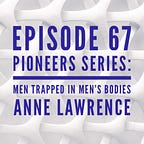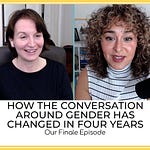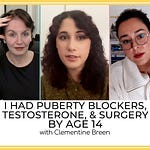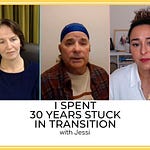Dr. Anne Lawrence is a physician, sex researcher, and academic writer. She is also a postoperative male-to-female transsexual who underwent gender transition in 1996. Since early childhood, she had experienced an intense desire to have a female body, but she had been unable to find any scientific or popular descriptions of transsexualism that spoke to her experience. This changed in the early 1990s when she discovered Dr. Ray Blanchard’s writings about the concept of autogynephilia, which he defined as “a male's propensity to be sexually aroused by the thought or image of himself as a female.” Blanchard’s revolutionary concept gave Dr. Lawrence an essential insight into the meaning of her desire for sex reassignment, and it helped her find the courage to undergo gender transition.
Dr. Lawrence subsequently began to research and write extensively about transsexualism and associated issues, both in academic journals and on her website, “Transsexual Women’s Resources.” She is best known for her controversial book, Men Trapped in Men’s Bodies: Narratives of Autogynephilic Transsexualism, published in 2013. The book provides a detailed summary and analysis of existing research about autogynephilia and related phenomena. It also contains excerpts from narratives submitted by over 200 male informants, describing their personal experiences of autogynephilic transsexualism and gender dysphoria.
Anne tells us about her early experiences with AGP in childhood, how she tried various ways to sometimes navigate, alleviate or avoid this propensity. She ultimately transitioned in her 40s. Anne is now 71 and reflects on the long game. We spend time talking about her finding Dr. Blanchard’s work and her own research, her book, and her academic interest in understanding this AGP experience.
The end of the conversation took an unexpected turn when she described mindset, the intensity, and the desperate measures that seem so reasonable when you’re tortured with severe autogynephilia. For the record, Anne has not been involved in the field for many years and her reflections do not encompass the ROGD phenomenon. Stella and I feel it’s important to listen to people’s experiences so we can understand all the manifestations of GD. However, we believe in the power of therapeutic intervention and we don’t think a nihilistic approach is helpful to deeply distressed individuals.
Links:
2008 Paper: Shame and Narcissistic Rage in Autogynephilic Transsexualism
2013 Book: Men Trapped in Men’s Bodies
Springer.com/book/10.1007/978-1-4614-5182-2
Extended Notes
Anne opens the discussion by breaking down what autogynephilia is.
She also talks about studies that describe children having autogynephilia.
Anne shares her personal history with autogynephilia starting when she was just a child.
When Anne told her parents she wanted to be a girl, she was sent for psychotherapy and thought it wasn’t going to be helpful.
What did Anne’s therapist do to break empathy and connection?
Anne experimented with estrogens at age eighteen.
She shares her realizations after her attempt at self-castration.
How did she come to the idea of how she used estrogens back then? Where did she get it from?
Anne made several attempts to not express her autogynephilic feelings. She shares what those attempts were.
How did Ray Blanchard’s work shift Anne’s thinking or experience of her propensities?
Anne graphically describes how she despaired really liking her male body.
After transitioning in her forties, does she think it was the right time or should she have done it earlier?
Anne shares how she de-emphasized her feelings of autogynephilia to therapists before transitioning. She explains why.
Why did Anne shift her studies from mathematics to medicine?
Anne explains why transition is not a cure for autogynephilia.
What are other limitations or consequences that people should be aware of with transitioning?
The process of undergoing transition is so arduous that people shy away from the concept of regret because it isn’t psychologically efficient to think about.
Stella asks Anne about the sexual drive that drives the autogynephilic male to transition. Would transition nullify the reason, post-operative?
Sasha shifts to ask Anne about her book, Men Trapped in Men's Bodies. What was the reason behind and the process of writing it?
Was there any controversy around her book? Was there any pushback?
Stella and Sasha talk about ROGD and ask Anne if she sees any overlap with it to autogynephilia.
Sasha then asks Anne to expound on the paper she wrote about narcissistic rage.
The lack of mirroring and idealization predisposes a person to the feeling that they are deeply inadequate and the defense against this is to develop a narcissistic attitude. Anne provides examples to explain further.
According to Ray Blanchard and Mike Bailey, the combination of autogynephilia and narcissism is not inevitable; it does not happen to all of them. Anne shares her thoughts.
Should people with autogynephilia get married? How does that impact their wives and kids?
Stella asks Anne to elaborate further about analloeroticism.
What do you do with very young autogynephiles?
There is more than one way to eliminate the effects of testosterone on the body in adolescents. Anne shares what could be another option.
Anne thinks it’s essential that we look for ways to try to achieve early interventions in individuals who identify as autogynephilic and recognize it as severe very early. She shares the last research she had on this topic.
What would Anne ask the average clinician where autogynephilia is not allowed to be discussed?
Stella asks Anne to share the prevalence rates in her research of autogynephilia. Anne expounds on this topic further.
To close, Anne recognizes her debt to other researchers in this area of study.
This podcast is sponsored by ReIME and Genspect. Visit Rethinkime.org and Genspect.org to learn more.
For more about our show: Linktr.ee/WiderLensPod











